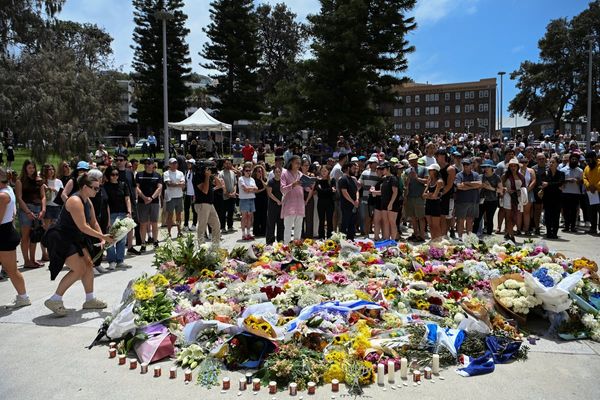
Academics and students at the University of Sydney have blasted the vice-chancellor for a “draconian” protest crackdown that requires explicit permission for megaphones to be used or posters to be put up on campus.
The policy, quietly introduced last week, demands three days’ notice for demonstrations to be held and approval for putting up “materials, banners or structures” on campus, using megaphones or amplifiers, erecting temporary structures and using cooking equipment.
It follows last month’s dissolution of the university’s pro-Palestine encampment, which was the longest running in Australia and faced sustained criticism from some Jewish groups and the Coalition.
In an email sent to staff on 4 July after the changes were implemented, the vice-chancellor, Mark Scott, said the encampment had “challenged” the university in many ways and ensuring campus was a safe environment was his “top priority”.
“At its core – this policy upholds our commitment to free speech – while recognising we need to be able to manage our environment for the safety and security of all,” he wrote.
“As we engage with each other during times of great challenge and polarity in broader society, it’s important we have the right settings in place.
“The university … will of course continue to support and give permission to activities that contribute to our campus life, including stalls run by USU clubs and societies.”
Open fires, camping and demonstrations without notice were also banned, as were “any activity that presents an unacceptable health or safety risk” and indoor demonstrations.
Students and staff faced removal from campus or disciplinary action if they did not comply with the measures.
The president of the university’s branch of the National Tertiary Education Union, Nick Riemer wrote to Scott on Saturday warning that the branch committee would be meeting imminently to decide ways to respond until the policy was rescinded, adding preliminary advice suggested it may be illegal.
He told Guardian Australia the university was mirroring a crackdown on free speech that was associated with “authoritarian regimes”.
“Open and unobstructed protest is essential to any functional democratic community, particularly one which is oriented to the creation and promotion of knowledge,” the letter read. “The casualness with which you have just attempted to repress it is, frankly, extraordinary.
“I am giving you notice now that, in the name of the defence of elementary civil liberties, I refuse to be bound by the policy and will ignore it, regardless of the consequences. I know I am far from alone.”
A spokesperson for the University of Sydney told Guardian Australia the institution had a rich history of activism and protest but the campus was “not a camping ground”.
“All students and staff have the right to express themselves freely as long as it’s done safely and in accordance with our policies and the law,” they said.
“We uphold our students’ right to express their opinions in a respectful way and safe demonstrations are still very supported, but this policy makes it clear that our campus is not a camping ground.”
The spokesperson said the university “considered relevant legislation in the updating of this policy which still protects the legal right to protest. We consider the policy to be lawful and appropriate.”
A student at the University of Sydney and member of Students Against War, Jacob Starling, said Scott was “waging a war” on the democratic right to protest and would be challenged.
“This policy must be withdrawn immediately, and if it isn’t withdrawn it must be defied,” he said.
“Students and staff will not be silenced and we will continue to stand in solidarity with Palestine, no matter what draconian policy the university introduces.”
The Student Representative Council’s president, said the policy was a direct response to the sustained campaign against the university’s ties to weapons manufacturers and Israeli academic institutions.
The university’s encampment was peacefully disbanded last month with some concessions agreed to by Scott. Multiple students were facing disciplinary action for participating in protests, including suspensions for interrupting classes.
Brennan said university campuses “must be places for students to exercise their democratic right to peaceful, lawful protest”.
“This is a repulsive full-scale offensive on the right to protest at the University of Sydney,” he said.
“Students shouldn’t need permission to protest on their own campus. Students shouldn’t need permission to use a megaphone or set up a stall, and students absolutely shouldn’t need permission to challenge their university’s connection to genocide.”
David Brophy, historian of China and Inner Asia at the University of Sydney, said the policy had been adopted “without any notice or consultation”.
“[The] new policy … is an astonishing attack on political freedom at the university,” he posted on X.
The Greens deputy leader and higher education spokesperson, Senator Mehreen Faruqi, called on Scott to reverse the policy.
“What we are seeing here is a despicable attempt by neoliberal, corporate university management to stifle student activism and shut down political expression,” she said.
“Staunch campus activism has changed the world. Universities campuses should always be political spaces where students and staff are encouraged to speak out on issues of social, racial and environmental justice.”
The former head of journalism at the University of Technology Wendy Bacon labelled it “draconian”.
“This is a historic step backwards and is an attempt to intimidate staff and students,” she posted on X.







